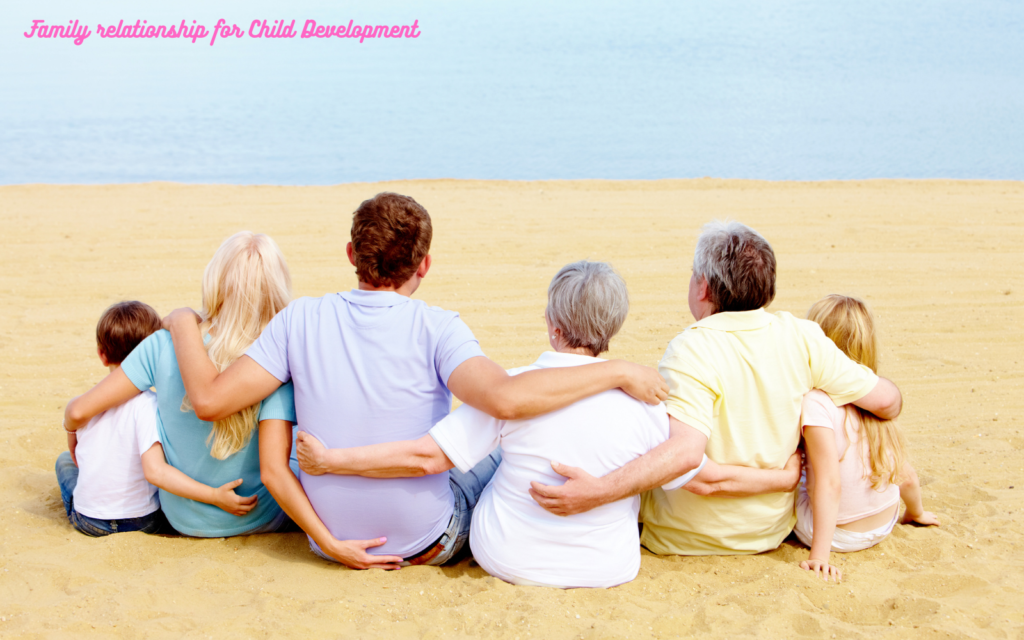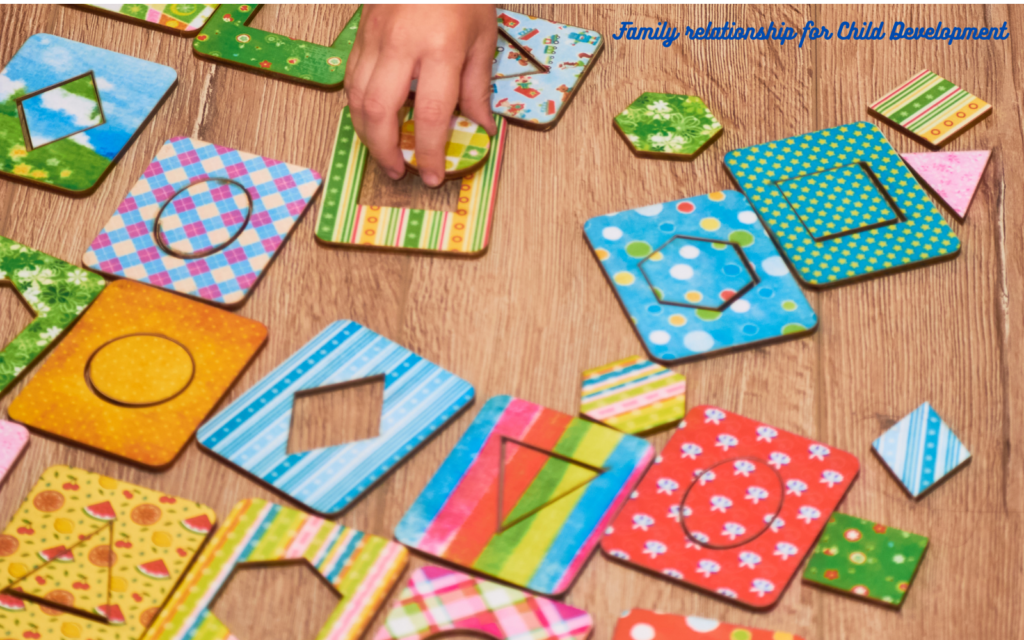Introduction: Impact of Family Relationships on Child Development

Children’s development depends on family interactions. Family connections, communication, and support affect a child’s emotional, social, and cognitive development. Positive family relationships can give children stability, belonging, and self-esteem, essential for their development.
Children learn to speak, develop connections, and regulate emotions by seeing and engaging with family. Healthy family interactions help kids develop resilience, empathy, and social skills. Negative or strained family relationships can cause low self-esteem, behavioral challenges, and trouble building healthy relationships outside the family.
Understanding family dynamics and creating a caring and nurturing family environment is crucial for optimal child development. Parents, caretakers, and other family members help children develop and reach their full potential by providing a safe and loving environment.
Table of Contents
Importance of family relationships in child development:
Family interactions shape children’s development in many ways. Family interactions affect a child’s emotional, social, and cognitive development. Healthy families nurture children and make them feel loved, appreciated, and supported. A good growth foundation requires this support structure.
Children gain social and emotional abilities by seeing and interacting with their parents, siblings, and other family members. Positive interactions generate trust, communication, and empathy, which are essential for healthy relationships. Family security and belonging boost children’s well-being and self-esteem.
Negative or strained family interactions might harm a child’s growth. Children’s mental health, conduct, and ability to build meaningful relationships might be affected by family conflict, lack of support, or inconsistent caring. A child’s development and long-term well-being depend on developing these ties.
Family ties are where children learn about themselves, others, and the world. Carers may establish a nurturing atmosphere that promotes healthy child development and lays the stage for future success by fostering positive, supporting, and loving family interactions.
Influence of family dynamics on a child's emotional well-being:

A child’s emotional well-being and growth are greatly affected by family dynamics, which include interactions, connections, and communication. How family members interact, express feelings, and resolve problems can impact a child’s knowledge of relationships, emotions, and coping.
Family dynamics that foster open communication, respect, and emotional support help children’s emotional well-being. Children feel protected, loved, and respected in such circumstances, boosting their self-esteem and emotional resilience. Healthy family dynamics give children a safe space to explore their emotions, develop empathy, and learn stress-management skills.
However, family strife, criticism, and neglect can harm a child’s emotional health. Hostile or unsupportive surroundings can cause uncertainty, anxiety, and low self-esteem in children. Family conflict and poor communication can cause mental anguish and make it hard to build good connections beyond the family.
Family relationships and strong family bonds must be understood and addressed to support a child’s emotional development. Caregivers can foster a child’s emotional intelligence, mental health, and happiness by encouraging healthy family relationships, emotional expression, and dispute resolution. Strong family interactions help children manage their emotions, create positive relationships, and succeed in life.
Communication and support within the family unit:
Family communication and support are crucial to a child’s development and well-being. Effective communication includes sharing information, feelings, opinions, and needs in a courteous and understanding manner. Family support makes children feel heard, respected, and cared for.
Family communication improves children’s connections and emotional development. Children develop critical social and communication skills when family members listen, speak openly, and show empathy. They learn to express themselves, overcome disagreements, and form trusting, understanding relationships.
A child’s self-esteem and resilience also depend on family emotional support. Family love, support, and reassurance make youngsters feel comfortable and confident. Children get emotional assistance to overcome obstacles, manage stress, and build self-esteem.
Lack of family contact or support might impede a child’s development and emotional well-being. In circumstances with poor communication, ignored emotions, or inconsistent support, children may struggle to express themselves, cope with problems, and build healthy connections.
Caregivers can foster optimal child development by emphasizing open communication and unconditional support in the family. Strong family relationships with good communication and support help children develop emotionally, socially, and cognitively, preparing them for life.
Impact of healthy family relationships on social skills and self-esteem:
Healthy family interactions help children develop social skills and self-esteem. A supportive family setting allows children to learn and practice crucial social interactions that develop their communication, collaboration, and relationship skills.
Children acquire good social skills through positive familial interactions. Children learn to communicate, manage disagreements, and collaborate from family relationships. Social interactions help children understand different views, empathize with others, and manage social circumstances.
Children’s self-esteem is directly affected by healthy family interactions. Family affection, affirmation, and positive reinforcement help youngsters develop a positive self-image and self-worth. Children gain confidence, resilience, and self-belief when they feel supported and appreciated by their family.
Negative or dysfunctional family interactions might affect children’s social and self-esteem growth. Conflict, criticism, and neglect can cause insecurity, inadequacy, and trouble making friends.
Caregivers can help children develop strong social skills and a positive self-image by promoting open communication, mutual respect, and emotional support in family connections. These fundamentals improve a child’s social skills and mental and emotional health. Family interactions establish a child’s social skills and self-esteem, laying the groundwork for healthy growth and successful partnerships.
Risks associated with negative or strained family relationships:
Family strife can harm a child’s growth and well-being. Conflict, criticism, neglect, or inconsistency in the home can affect children’s emotional stability, social, and cognitive development.
Negative family interactions can harm children’s mental health. Children in conflict-ridden or volatile environments can develop anxiety, tension, and insecurity. Low self-esteem, sadness, and anxiety may result from such situations.
Negative family ties can also impair a child’s social development and relationships. Children who have poor family dynamics may have trouble trusting others, communicating, or regulating their emotions in social situations. Their capacity to form healthy relationships and manage social situations may suffer.
Stressed family ties can also affect a child’s well-being and academic achievement by causing instability. Children thrive in safe, loved, and supportive family contexts. Due to bad family dynamics, children may struggle in school, friendships, and emotional resiliency.
Negative family interactions pose dangers that must be mitigated to support a child’s development and well-being. Caregivers can create a more loving environment that encourages healthy growth and resilience in children by recognizing and improving family communication, conflict resolution, and emotional support. A supportive and caring home environment is crucial for a child’s development since family ties shape future results.
Role of parents and caregivers in fostering a supportive family environment:

Parents and caregivers are crucial to creating a supportive home environment that promotes child development and well-being. Their actions, behaviors, and interactions affect family ties and a child’s emotional, social, and cognitive development.
Parents and caregivers shape family ties by modeling positive conduct and communication. Children learn how to interact, express emotions, and resolve conflicts by seeing and copying their parents and caregivers. Parents can provide a good example for their children by showing respect, empathy, and good communication.
Children need emotional support, affection, and instruction from parents and caregivers to develop well. A loving atmosphere where children feel safe, cherished, and understood is essential for security and self-esteem. Children who get constant parental love and support can better handle obstacles, manage their emotions, and form healthy relationships.
Parents and caregivers can also improve family dynamics through open communication, active listening, and dispute resolution. Parents can enhance their children’s sense of belonging, acceptance, and well-being by developing trust, understanding, and collaboration.
Parents and caregivers are crucial to healthy child development and solid family ties by creating a supportive home environment. Positive relationships, emotional support, and good family communication can create a caring atmosphere that helps children develop emotionally, socially, and academically. Caring and supporting parents help children overcome life’s problems and form positive relationships.
Creating a safe and loving space for children to thrive and grow:
For children’s development, families must provide a safe and loving environment. A child’s emotional, social, and cognitive development depends on family bonds, which parents and caregivers shape.
Safe and caring families give children security, stability, and belonging. Children develop and reach their potential when they feel protected in their families. Secure youngsters develop a strong self-image, resilience, and confidence in their skills.
Parents and caregivers nurture and encourage children in loving families. This support boosts self-esteem, emotional well-being, and confidence in facing obstacles. Trust and acceptance are necessary for good child development, and family love and value build them.
Another benefit of a safe and loving family is open communication, trust, and pleasant relationships. These interactions teach kids empathy, dispute resolution, and communication. These skills help children create solid family and other relationships.
Parents and caregivers help children grow emotionally, socially, and academically by fostering a safe and loving home. Love, respect, and support in family relationships give children the emotional security and stability they need to face life’s obstacles and build healthy relationships. A safe and caring home environment is essential for children to attain their full potential and live fulfilled lives.
Conclusion:
Family interactions influence a child’s growth in many ways. Family connections, communication, and support affect a child’s emotional, social, and cognitive development. Positive family ties foster healthy development by making children feel loved, valued, and secure.
Family interactions affect a child’s emotional, social, self-esteem, and resilience. Positive family interactions teach children empathy, communication, and problem-solving. These skills are crucial for good relationships, emotional management, and social interactions.
Negative family relationships can harm a child’s development, causing low self-esteem, behavioral challenges, and struggle to create good relationships. Supporting a child’s emotional, social, and overall well-being requires changing family dynamics.
Parents and caregivers can nurture healthy child development by developing excellent family ties with open communication, empathy, and support. Strengthening family bonds helps kids develop social and emotional skills for school, relationships, and life. Children learn about the world, acquire self-esteem, and prosper in all areas of life through family ties.
Finally, family interactions shape a child’s emotional, social, and cognitive development from an early age. Positive family ties create a safe and supportive atmosphere that helps children reach their potential and overcome life’s problems. Healthy child growth and a happy, fulfilled future depend on solid family relationships.
People also ask:
Family structure affects a child’s emotional, social, and academic development. Divorce and single parenthood can be difficult, but stable and supportive families generally succeed. Each family dynamic affects a child’s views, attitudes, and conduct, affecting their development.
The way a kid interacts with their family affects their emotional health, social skills, and sense of self-worth. Negative dynamics can cause problems like low self-esteem and behavior issues, while positive dynamics help kids grow up in a healthy way.
Can you be more specific about the content of your article? After reading it, I still have some doubts. Hope you can help me.